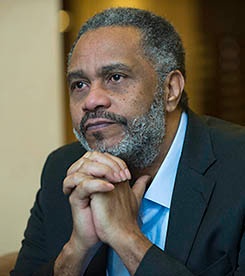
Anthony Ray Hinton spent almost 30 years in prison, 1985 to 2015, for a crime he didn't commit. He will share his story on Monday, March 14, at 1:30 p.m. in Community Hall.
Hinton was convicted of killing two Birmingham, Alabama, men in separate incidents in 1985 although there were no eyewitnesses, no fingerprints linking him to the scene, and no physical evidence to place him at either location. During one of the murders, Hinton was seen working in a warehouse 15 miles away from the killing. He even passed a polygraph test that was never admitted into evidence.
Authorities relied on the analysis of a handgun found in his mother's house and bullets from the murders to convict him. Despite later conclusions by ballistics experts that the bullets did not match the gun, the state refused for years to reconsider the evidence.
It was only after the Equal Justice Initiative (EJI) argued on his behalf for more than 13 years that the U.S. Supreme Court heard the case and ruled unanimously that his constitutional right to a fair trial had been violated. Upon Hinton's release in April 2015, Bryan Stevenson, executive director of EJI, said, "The refusal of state prosecutors to reexamine this case, despite persuasive and reliable evidence of innocence, is disappointing and troubling."
In a written statement, the EJI indicated its belief that Hinton's conviction was the result of the prosecutor's racial bias. Cathleen Price, one of EJI’s senior attorneys, will be on stage with Hinton on March 14.
While Hinton spent three decades in a five-foot by eight-foot cell, his mother died. He was not permitted to attend her funeral. The world also changed in other ways while Hinton was behind bars. There was no Internet, email or social media when he was convicted. Finally free, he is slowly adjusting to a world steeped in technology.
Hinton's case is similar to those featured in Stevenson's 2014 book, Just Mercy. According to Ted Conover, who reviewed the book for The New York Times, soon after Stevenson graduated from Harvard Law School “he began representing poor clients in the South, first in Georgia and then in Alabama, where he was a co-founder of the Equal Justice Initiative. Just Mercy focuses mainly on that work, and those clients.”
The book will be on sale after the event.
The Just Mercy discussion will continue on March 14 from 5-7 p.m. All members of the campus community are invited to Book Club, sponsored by the University Library and staff from the Division of Continuing Adult & Professional Studies in Room 336 in Bachmann Main Building.
 CHALLENGE
CHALLENGE





